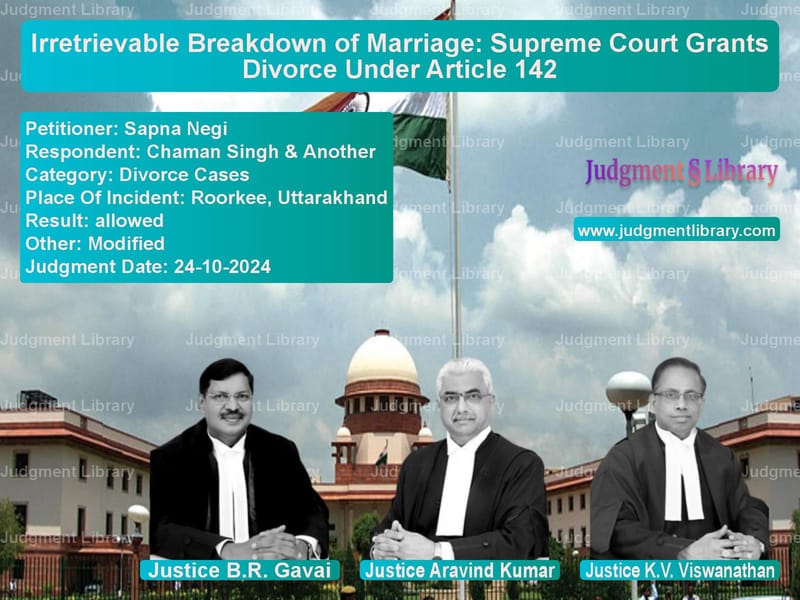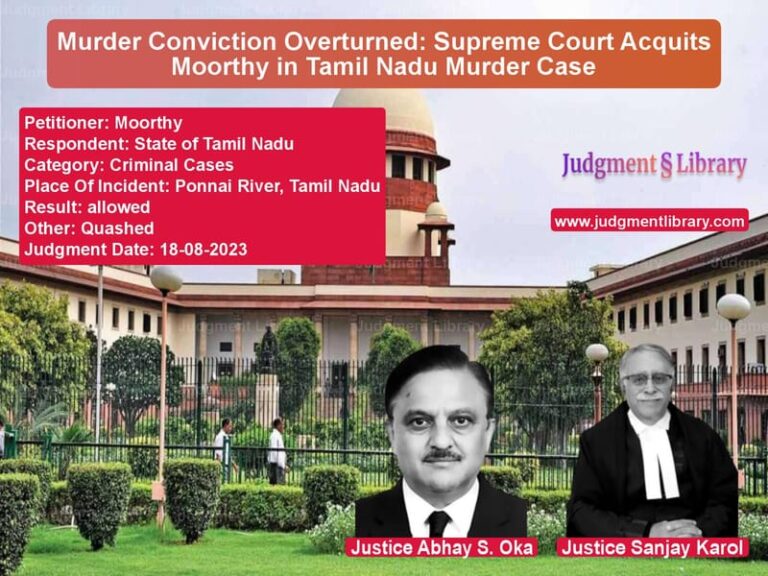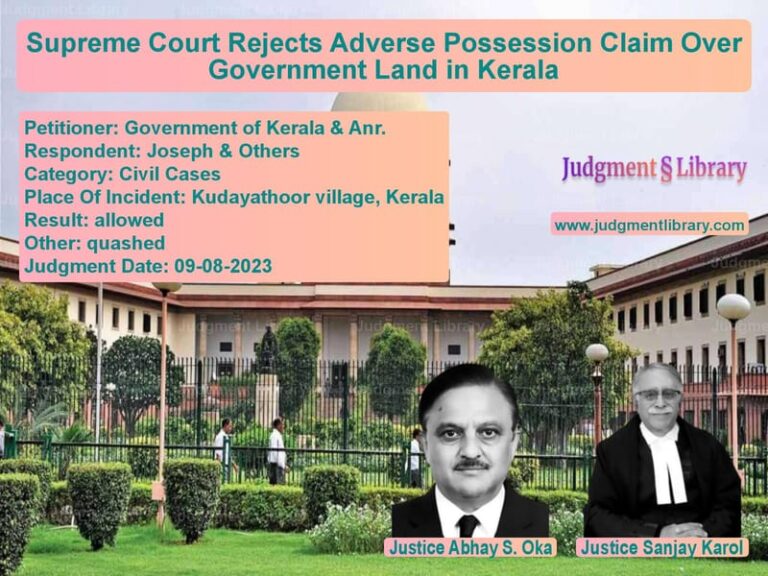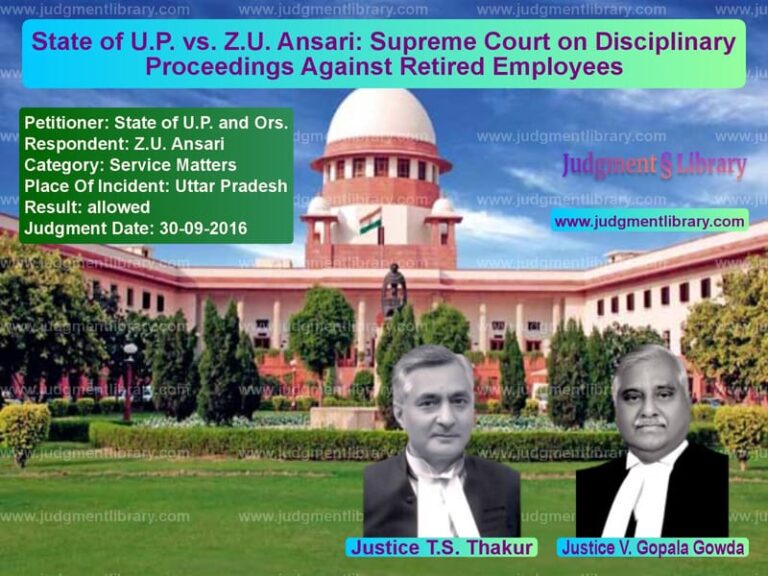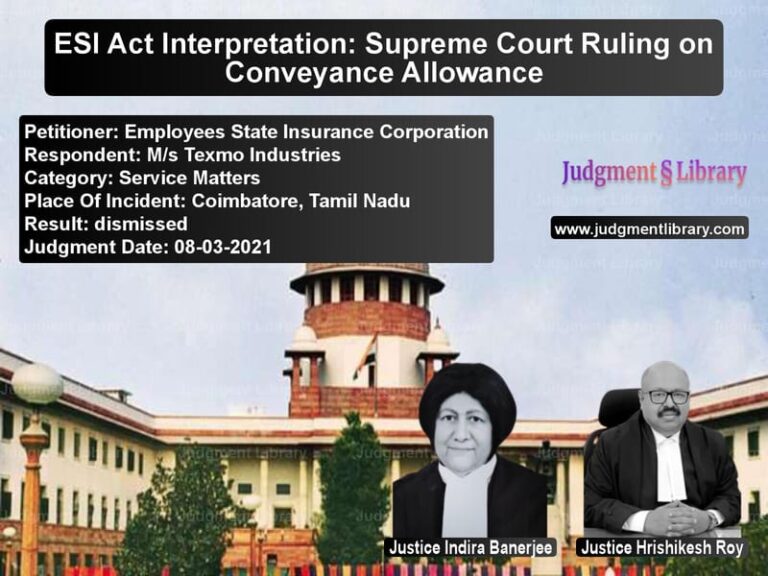Irretrievable Breakdown of Marriage: Supreme Court Grants Divorce Under Article 142
The case of Sapna Negi vs. Chaman Singh & Another is a significant Supreme Court ruling concerning the dissolution of marriage due to irretrievable breakdown. The judgment, delivered on October 24, 2024, exercised the extraordinary powers under Article 142(1) of the Constitution of India to grant a decree of divorce, ensuring complete justice between the parties.
Background of the Case
The marriage between the petitioner, Sapna Negi, and the respondent, Chaman Singh, was solemnized on May 12, 2013. The couple had a daughter born on May 18, 2016. However, due to severe matrimonial discord, the respondent-husband filed a petition under Section 13(1)(i-a) of the Hindu Marriage Act, 1955, seeking divorce, alleging cruelty and desertion by the petitioner-wife.
According to the respondent, the petitioner had breached trust and was in a relationship with another individual. He further alleged that despite his efforts to reconcile, the petitioner had neglected her marital responsibilities and completely distanced herself from him since 2019. The petitioner, on the other hand, contended that the husband had failed to provide care and financial support for their daughter, forcing her to leave the matrimonial home and reside with her parents.
The case was initially referred to the Supreme Court Mediation Centre to explore the possibility of reconciliation. However, the mediation failed, confirming that the marriage had broken down irretrievably.
Petitioner’s Arguments
- The petitioner-wife argued that she was forced to leave the matrimonial home due to the respondent’s neglect and lack of support.
- She claimed that she had taken up employment as a teacher in 2022 to support herself and their daughter, as the respondent had failed to provide for them.
- She contended that while the respondent had deposited Rs. 7,00,000 in a fixed deposit for their daughter’s future, she was not a signatory to any settlement and did not agree to the terms.
- The petitioner sought the transfer of the ongoing divorce case from Roorkee, Uttarakhand, to the Family Court at Patiala House, New Delhi, citing inconvenience and financial constraints.
Respondent’s Arguments
- The respondent-husband alleged that the petitioner had deserted him and refused to return to the matrimonial home despite multiple requests.
- He argued that the petitioner had entered into a relationship with another individual and was no longer interested in the marriage.
- He maintained that he had provided financial assistance for their daughter and was willing to settle the matter with additional alimony.
Supreme Court’s Observations
- The Court observed that the marriage had broken down irretrievably, and there was no possibility of reconciliation.
- It emphasized that forcing the parties to remain in a legally binding marriage would serve no purpose and would only prolong their suffering.
- The judgment referenced the landmark case of Shilpa Sailesh v. Varun Sreenivasan, where the Court held that it has the discretion to dissolve a marriage under Article 142 if it is evident that cohabitation is impossible.
- The Court noted that both parties were young (32 and 38 years old) and had a future ahead of them, which should not be hindered by a failed marriage.
Supreme Court’s Ruling
- The Court exercised its powers under Article 142 to grant a decree of divorce, dissolving the marriage solemnized on May 12, 2013.
- It ordered the respondent-husband to pay a permanent alimony of Rs. 13,00,000 to the petitioner, in addition to the Rs. 7,00,000 already deposited in the daughter’s fixed deposit.
- The petition pending before the Family Court in Roorkee was disposed of accordingly.
- The Court clarified that its decision was made to ensure complete justice and prevent unnecessary legal hardships for both parties.
Legal Implications of the Judgment
This ruling sets a significant precedent in matrimonial law:
- Recognition of Irretrievable Breakdown of Marriage: The Court reaffirmed that in cases where reconciliation is impossible, it can exercise its constitutional powers to dissolve the marriage.
- Use of Article 142 for Complete Justice: The judgment highlights the discretionary power of the Supreme Court to bypass procedural hurdles and grant relief when justified.
- Financial Security for the Child: By ensuring that the minor child’s future was financially secured, the Court upheld the principle of equitable justice.
- Preventing Prolonged Litigation: The ruling prevents unnecessary legal proceedings that would otherwise cause emotional and financial strain on both parties.
Conclusion
The Supreme Court’s decision in this case is a landmark ruling that reinforces the principle that a marriage that has completely broken down should not be continued merely for legal formalities. By granting divorce under Article 142, the Court has provided a practical resolution that ensures fairness, dignity, and justice for both parties while safeguarding the interests of their minor daughter. This judgment will serve as a guiding precedent for similar matrimonial disputes in the future.
Petitioner Name: Sapna Negi.Respondent Name: Chaman Singh & Another.Judgment By: Justice B.R. Gavai, Justice Aravind Kumar, Justice K.V. Viswanathan.Place Of Incident: Roorkee, Uttarakhand.Judgment Date: 24-10-2024.
Don’t miss out on the full details! Download the complete judgment in PDF format below and gain valuable insights instantly!
Download Judgment: sapna-negi-vs-chaman-singh-&-anoth-supreme-court-of-india-judgment-dated-24-10-2024.pdf
Directly Download Judgment: Directly download this Judgment
See all petitions in Alimony and Maintenance
See all petitions in Child Custody
See all petitions in Mutual Consent Divorce
See all petitions in Property Division in Divorce Cases
See all petitions in Judgment by B R Gavai
See all petitions in Judgment by Aravind Kumar
See all petitions in Judgment by K.V. Viswanathan
See all petitions in allowed
See all petitions in Modified
See all petitions in supreme court of India judgments October 2024
See all petitions in 2024 judgments
See all posts in Divorce Cases Category
See all allowed petitions in Divorce Cases Category
See all Dismissed petitions in Divorce Cases Category
See all partially allowed petitions in Divorce Cases Category

